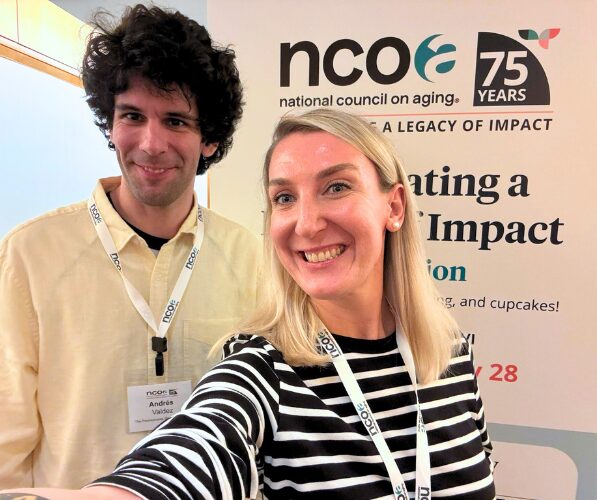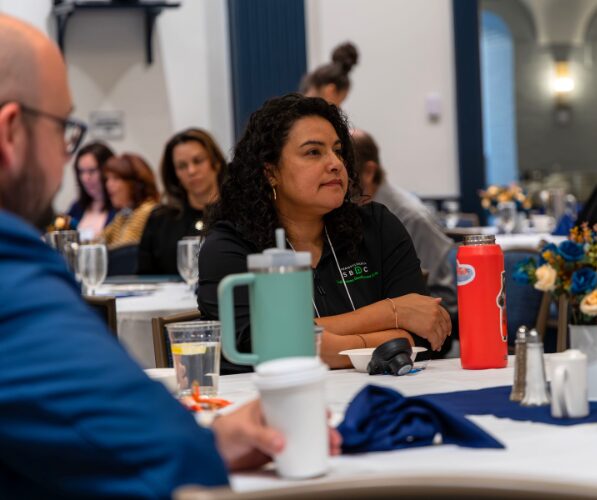Success Story
Penn State startup works to detect respiratory illnesses through vocal patterns
UNIVERSITY PARK — In the midst of the COVID-19 pandemic, Andrés Valdez found himself sick at home and in need of a COVID test. During that time, COVID tests were frequently out of stock, leaving many people without the tools to confirm their illness or safely return to daily life. Andrés thought there had to be a better way to test for COVID.
A lifelong rock music fan and curious engineer, Andrés detected that his voice sounded noticeably different when he had COVID. He began tracking changes in his own vocal patterns — and the idea for TalkingSick was born.
Using AI-driven pattern recognition, TalkingSick analyzes short voice recordings to detect deviations from a user’s healthy voice baseline. These deviations could signal potential respiratory illnesses before physical symptoms appear.
“When the Omicron variant hit the East Coast in 2022, pharmacies were out of stock and you couldn’t get COVID tests for free anymore,” said Andrés, an assistant research professor in biomedical engineering at the Penn State College of Engineering. “I was stuck at home, waiting for tests to come, but the tests weren’t coming. So I started playing around with my voice. Part of the data we’re building this startup on is from my own voice—how it was damaged and how it recovered before, during, and after being sick.”
TalkingSick aims to lower costs for providers and patients, extend the intervention window for respiratory illnesses, address “silent” cases (such as false negatives that can come from other testing methodologies), and increase patient compliance through its non-invasive approach.
After gathering initial data and growing more confident in the idea, Andrés attended a seminar about the Invent Penn State NSF I-Corps regional short course program. The program provides research-based startups with the opportunity to conduct customer interviews, learn the basics of launching a startup, and evaluate the potential of their business idea.
When he learned he needed an entrepreneurial lead for the program, Andrés invited his wife, Anna Borisova De Valdez, onto the team. Anna brings a background in marketing and management to the formerly STEM-focused team, and she is currently pursuing dual degrees, an MBA and a Master of Business Analytics (MBAN) at the Penn State Smeal College of Business. The team was rounded out by Andy Atkins, a member of the Invent Penn State Startup Leadership Network, as well as an entrepreneur-in-residence and NSF I-Corps instructor at Penn State, who serves as their industry mentor.
Through the short course, the team learned that customers were less concerned about COVID-19 testing than they had been previously. With the fear around COVID diminishing, the team pivoted their focus to include detection of the flu and other respiratory illnesses.
“It was great practice—we did 20 interviews in three weeks,” Andrés said. “It got us out of the science mindset and into asking people, What’s your biggest problem?”
To keep up their momentum, the team entered the Happy Valley LaunchBox powered by PNC Bank Idea TestLab. They advanced to the NSF I-Corps National Teams program, which they completed in June 2025. The program requires teams to complete at least 100 customer interviews in just seven weeks. From those interviews, Andrés and Anna learned that older adults are less likely to present symptoms such as a fever but are more vulnerable to common illnesses. Anna said TalkingSick’s technology could help detect early warning signs that thermometers miss, which they wouldn’t have learned without the I-Corps customer interviews.
“Andy (Atkins) did an amazing job connecting us with the Penn State alumni network,” Anna said. “We’re so grateful for the Penn State community—we had fantastic interviews with clinicians, nurses, hospital administrators, biotech researchers, and professionals from pharmaceutical companies. Because Penn State is so large and has so many departments, medical hospitals, and the largest alumni network in the world, completing the required number of I-Corps interviews was much easier. We usually asked for just 10 minutes of people’s time, but Penn Staters are so willing to give back that many of those interviews lasted 30 to 60 minutes. It was such a great experience.”
Currently, TalkingSick is exploring various options to test its technology in real-world settings and seeking opportunities to collaborate with healthcare providers and Penn State departments to support evaluation and refinement. The team has also begun the process of forming their startup and licensing the IP with assistance from the Penn State Office of Technology Transfer (OTT) and the Penn State Office of Entrepreneurship and Commercialization (OEC).
“Science is wonderful,” Andrés said. “But a lot of it ends up in publications with few readers. If you think your work has value, I say try turning it into a product.”
“I’m from Russia and Andrés is from Argentina, and we also lived in Brazil for a while,” Anna added. “In science, especially international researchers like us, there’s often a fear of reaching out or conducting interviews. I felt that too at first—but I’ve learned it’s not so scary. People are much kinder and more open than you expect. You just have to take that first step outside your comfort zone. We were also fortunate to have support from Nancy Ross Mahon, clinical professor of business communication at Penn State, who helped us build confidence and improve how we communicate our story.”
About NSF I-Corps
The NSF I-Corps program uses experiential education to help researchers gain valuable insight into entrepreneurship, starting a business or industry requirements and challenges. I-Corps enables the transformation of invention to impact. The curriculum integrates scientific inquiry and industrial discovery in an inclusive, data-driven culture driven by rigor, relevance, and evidence. Through I-Corps training, researchers can reduce the time to translate a promising idea from the laboratory to the marketplace. Penn State University is part of the NSF I-Corps Mid-Atlantic Hub, a network of universities, NSF-funded researchers, established entrepreneurs, local and regional entrepreneurial communities, and other federal agencies. Hubs work collaboratively to build and sustain a diverse and inclusive innovation ecosystem throughout the United States.





